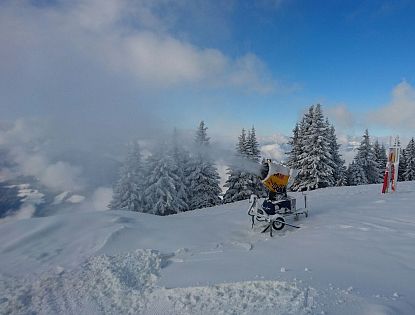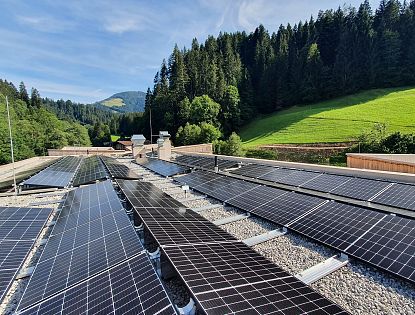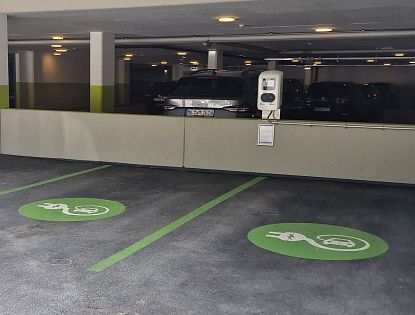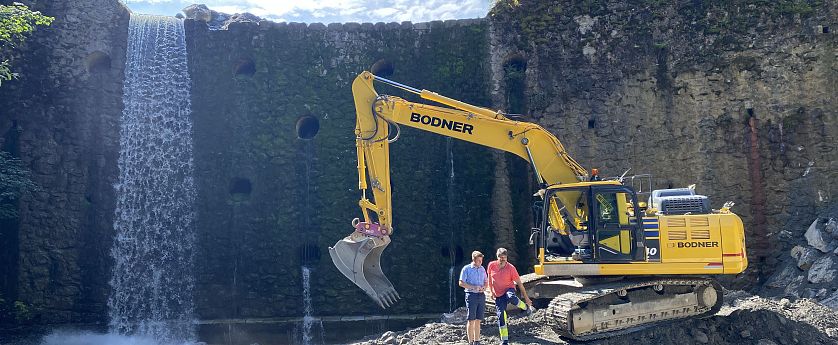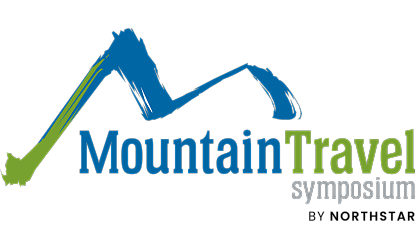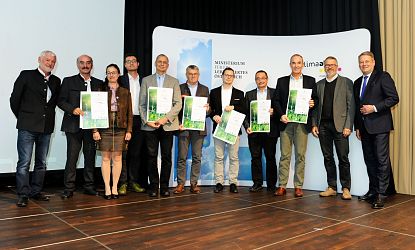Sustainable tourism in the SkiWelt
At SkiWelt Wilder Kaiser – Brixental, we combine the fun of winter with a commitment to protecting the environment. We use environmentally friendly energy sources and efficient systems to reduce electricity consumption and make snow production as sustainable as possible. We provide our guests with infrastructure to support eco-friendly travel, including charging stations for electric cars and connections to public transport for convenient access to the cable car. All our technology and facilities are based on state-of-the-art, energy-efficient equipment. We make your ski holiday sustainable through innovative projects and continuous improvements. The information below is backed up by facts from the Austrian Cable Car Association, providing a transparent overview of sustainable winter tourism in Austria.
Measures at a glance
- Snowmaking: A GPS-controlled snow management system with reservoirs on the mountain and pure drinking water.
- Energy: 100% green electricity from reservoirs on the mountain and sustainable energy generation, including solar energy, photovoltaic systems, a hydroelectric power plant and air heat pumps.
- Local products and economy: promoting agriculture, strengthening the economic structure and processing regional products to create year-round jobs.
- Mobility: buses and direct train connections to the ski area; charging stations for electric cars
Snowmaking
At SkiWelt Wilder Kaiser-Brixental, modern winter sports go hand in hand with sustainability, efficient energy and water usage, and nature protection. Snow is produced using efficient technology powered by air, water and Tyrolean hydropower — this is our 'purity principle' for snow. In 2017, we used a state-of-the-art GPS snow measurement system to measure every piste to the centimetre for the first time. In 2018/19 , over 70 SkiWelt piste machines were fitted with this GPS system, enabling effective evaluation and management of snow coverage from the cabin. This saves around 20–25% of resources (energy and water) each year.
The water used for snowmaking comes from special mountain lakes that are constantly filled by melting snow and rain. Using GPS, the snowmaking team can compare the current amount of snow on the slope with those GPS data, enabling them to produce the required amount of snow per section efficiently. In spring, the snow on the slopes melts and flows back into nature, creating a functional water cycle. The temporary water withdrawal and return therefore balance each other out.
Snowmaking in the SkiWelt
- In the SkiWelt, snow is produced using efficient technology that uses air, water and 100% Tyrolean hydropower energy.
- Pure drinking water is used for snow production. This is the required level of purity for the snow.
- 17 water reservoirs ensure efficient snowmaking by saving energy for water pumping systems.
- In summer 2017, each slope was accurately measured using GPS snow measurement systems so that it can now be prepared precisely every winter. Since the installation of these systems, around 20–25% of energy and water has been saved each year. The €500,000 investment has paid off!
- The water used for snowmaking comes from mountain lakes filled with snowmelt and rainwater. In spring, this water flows back into the natural environment. This creates a functional water cycle on the mountain.
Slope management in Austria
According to the Austrian Cable Car Association, most ski slopes are on natural terrain. Wherever slopes are created, care is taken to restore the natural landscape. Forests fulfil important functions in the Alpine region. They protect against avalanches, rockfall and erosion; provide a habitat for animals; improve air and water quality; and provide a space for visitors to enjoy leisure activities. To ensure the protection of plants, trees and wildlife, it is important that all guests stay on the marked trails. Reservoirs and snowmaking facilities are planned so as not to disturb the natural water balance, protect drinking water and streams, and allow animals to continue to move around freely. All actions are carried out in close collaboration with the forestry and torrent and avalanche control authorities.
Energy
The SkiWelt has been committed to using renewable energy for years. The entire ski area is powered by 100% green electricity from Tyrolean hydropower. Some of this energy is produced in-house. This commitment to the environment and the future has been recognised several times, and SkiWelt is now considered one of the most eco-friendly ski resorts in the world.
Production, consumption and recycling of energy in the SkiWelt
- Operating with 100% green electricity from Tyrolean hydropower
- 17 water reservoirs ensure efficient snowmaking by saving energy for water pumping systems
- The small hydropower plant in Söll covers around a quarter of Söll's energy requirements (100% in summer)
- The SkiWelt is home of the first ski lift to be powered entirely by solar energy
- Several buildings and stations have photovoltaic systems
- Air source heat pumps reduce the use of fossil fuels in heating systems.
- Since 2008, the hut has been heating its interior with the heat recovered from the gondola lifts
Share of energy consumption in Austria
Cable cars in Austria are among the most efficient in the world. They account for 0.75 TWh of total Austrian electricity consumption. This equates to just 1.2% of the total electricity consumed in the country (including snowmaking).
However, if you consider all forms of energy, including petrol, diesel, gas and heating oil, the share of cable cars is even smaller at just 0.325% ! In recent years, energy efficiency per gondola ride has improved by around 20%, which is clear proof of the success of innovative technologies and sustainable planning.
Local products and economy
In many places, cable car companies play a key role in supporting regional agriculture. Processing and selling local produce on the ski huts helps to strengthen local economic structures while minimising transport costs.
Boosting the local economy and improving living standards in the SkiWelt
- The cable car company supports local agriculture and, at the same time, provides farmers with an additional source of income through tourism.
- Our huts support the local economy by offering food made from local ingredients.
- The 80 or so huts are mostly family-run, providing a reliable source of income for entire families.
- Tourism from November to April and from May to November ensures year-round employment.
Austria's cable cars offer sustainable jobs in the mountains
Austria's cable cars represent sustainable development in all its forms. As employers, they take on social responsibility, offering a high-quality, safe working environment and helping to ensure that the valleys remain places worth living and working in. 65% of employees particularly appreciate working in the mountains, around 75% would recommend their employer to others, and 80% would like to continue working for their company long term.
The cable car industry is widely recognised as a reliable driver of economic stability, particularly in regions with weaker economies. With primarily local ownership, companies operate responsibly, continuously investing in modernisation and quality improvement. This creates secure jobs, reduces emigration and strengthens the regional living and working environment. Austria's cable car industry secures almost 127,900 full-time jobs. Of these, 17,100 are directly employed by cable car companies, while 110,800 jobs are in sectors that benefit directly, such as craft businesses, hospitality, and sports retail.
Mobility
To help you enjoy an environmentally friendly day on the slopes, we also focus on travel options and mobility. For example, ski depots at the valley stations help you to store your equipment on site. This creates more space on the free ski bus and in the car for other passengers, and means you won't have to carry anything around. There are also an increasing number of electric car charging stations at our valley stations to make your journey as climate-friendly as possible. We have additional partnerships with various transfer service providers, offering convenient and sustainable travel options from the region and more distant cities, so you can reach the slopes with ease.
Mobility in the SkiWelt
- SkiWelt ski buses are free for all skiers in ski equipment and with a valid ski pass
- As a pilot project with ÖBB, there is the "ÖBB Rail Tours - Sleeping in the Snow" offer, which allows guests to travel comfortably overnight on the Nightjet train from cities such as Düsseldorf, Hamburg or Amsterdam to the SkiWelt.
- Since 2018, a bus has been departing daily to take guests from Munich to the SkiWelt and back again.
- In addition, a long-distance coach takes guests from Hamburg, Brussels, Amsterdam and Berlin 5 times a week
- Electric charging stations at almost all mountain railway valley stations enable guests to travel by electric car and protect the environment in the process.
Mountain holidays in Austria are better for the environment
Every trip has an environmental impact, particularly in terms of transport, accommodation and leisure activities. A 2018 study by the Federal Environment Agency shows: Those travelling by train to ski or take a summer holiday in Austria only produce around 20 kg of CO₂ per day. By car, this figure rises to around 33 kg per day. For comparison: A long-distance holiday by plane, for example to the Maldives, generates around 426 kg of CO₂ per person per day.
The journey to and from the destination also makes a difference: travelling to and from Austria's mountains accounts for between 3 and 21 kg of total CO₂ emissions per person per day, depending on the means of transport. Flying to Spain, on the other hand, generates around 138 kg of CO₂ from the journey there and back alone. This shows that holidays in Austria's mountains are more climate-friendly than other types of trip!
All sustainability projects
Joint projects
| Project | Year of implementation | Area | Description |
|---|---|---|---|
| Ski area | Over 20 years | Energy | The entire SkiWelt is operated exclusively with 100% green electricity from Tyrolean hydropower. Only green electricity is also used for snowmaking and other equipment. TIWAG Inn power station (20 km away) |
| Heat recovery system Joint project SkiWelt Brixen & SkiWelt Westendorf | 2008 | Renewable energy | The Choralpe mountain restaurant is heated with the return heat from 2 gondola lifts: This project was planned at the same time as the new construction of the SkiWeltbahn Brixen and Choralmbahn Westendorf. |
| Snow measuring system | 2017 | Conservation of resources | Using GPS, the snow cover on all slopes is determined to within a few centimetres and informs the snow groomer drivers in real time during grooming how much snow is currently under their powerful snow groomers. Annual savings of 25% on snowmaking resources throughout the entire SkiWelt. |
| Bus pendulum | Since 2018 | Mobility | Daily bus shuttle from Munich to the SkiWelt and back from the start to the end of the season + 2x a week for night skiing. |
| Bus pendulum | 2015 - 16 / 16 - 2017 | Mobility | Long-distance coach 5 times a week in Hamburg, Amsterdam, Brussels or Berlin and get off in SkiWelt in the morning. |
| Night trains | 2019 | Mobility | Travel comfortably and easily overnight with the ÖBB Nightjet and start your skiing fun the next morning (Düsseldorf, Hamburg, Amsterdam). 3-6-day SkiWelt ski pass is included for each ticket type. All SkiWelt resorts that do not have a direct train station are also covered by a shuttle for the last mile. There is also a night train from London, Copenhagen or Stockholm |
| ÖBB Combi Ticket Winter Sports | 2019 | Mobility | Ski pass & train ticket to the SkiWelt Hopfgarten station and 1, 3 or 6-day ski pass. The combined ticket can be purchased at all train stations in Austria. The train station in Hopfgarten is only 100m away from the cable car. |
| Test e-skibus | 2022 | Mobility | Throughout the winter season, e-ski buses from various brands will be tested on a weekly basis in all SkiWelt resorts. The aim is to put them into full operation from 2024 and replace the conventional ski buses. Participation of tourism associations, municipalities, mountain railroads |

